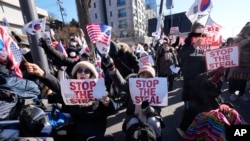In late 2021, the wife of then-presidential candidate Yoon Suk Yeol appeared exasperated by several journalists she insisted were treating her husband unfairly. In a leaked phone call with a left-leaning reporter, Kim Keon-hee vowed to have “all of them” jailed if her husband won the presidency.
The comment drew little attention, overshadowed by the scandals and mudslinging typical of South Korea’s elections. In hindsight, analysts say it hinted at how Yoon, now impeached and under investigation over his short-lived declaration of martial law, would later approach his critics as president.
After taking office in May 2022, Yoon pursued criminal defamation charges against journalists at an unprecedented pace, according to a VOA investigation. As his political fortunes declined, Yoon adopted increasingly adversarial rhetoric, often framing his opponents as existential threats in a zero-sum battle against “communists” and “anti-state forces.”
In declaring martial law early last month, Yoon used similar language, citing the need to “eradicate pro-North Korean forces.” He later defended the move as a temporary measure to warn his opposition rivals, whom he accused of obstructing governance. Critics, however, viewed the declaration as an authoritarian overreach.
The martial law decree, South Korea’s first since it emerged from military rule in the 1980s, put the Biden administration in an awkward position, having touted Yoon’s South Korea as a democratic model.
In 2024, Yoon hosted the U.S.-led Summit for Democracy, an event aimed at countering global authoritarianism. Weeks later, he made headlines by singing “American Pie” at a White House state dinner alongside President Joe Biden — a moment highlighting the administration’s embrace of Yoon as a key ally.
Part of that support stemmed from Yoon’s efforts to reconcile with Japan, which reinvigorated trilateral cooperation with the United States. The partnership became so central to Biden’s Asia policy that Washington seemed unwilling to confront mounting concerns about Yoon’s leadership, according to some analysts.
“The senior Biden team was so over-invested in Yoon as the key to its signature trilateral initiative with Tokyo and Seoul that it seemingly ignored all the many warning signs over the last year-plus of Yoon’s authoritarian bent,” said Rob Rapson, a recently retired U.S. diplomat who held several senior positions in South Korea, including acting ambassador.
During a visit to Seoul this week, U.S. Secretary of State Antony Blinken sidestepped questions about Yoon, instead praising South Korea’s democratic resilience. Blinken acknowledged “serious concerns” about Yoon’s actions, saying they were conveyed directly to Seoul.
Alliance frictions
After Yoon’s martial law decree, the United States temporarily paused key diplomatic and security talks with South Korea. Even though those engagements resumed by late December, some analysts say it may be premature to declare business as usual.
One sensitive issue is the U.S. claim that it was not notified in advance about the martial law declaration — a move that could have impacted the approximately 28,000 U.S. troops in Korea and heightened risks for both countries.
If no requirement exists for such notification, that may need to change, said Sheena Chestnut Greitens, an East Asia expert at the Carnegie Endowment for International Peace.
“The U.S. has reasonable grounds to say that having that information in advance is necessary for effective deterrence and defense on the Korean Peninsula,” she said.
Chestnut Greitens also warned that Yoon’s unilateral actions could weaken South Korea’s position with the incoming Trump administration, whose first-term policies raised fears of abandonment in Seoul.
Donald Trump frequently questioned the value of the U.S.-South Korea alliance, once asking why the U.S. needs “all those troops” in South Korea. His direct talks with North Korean leader Kim Jong Un further alarmed some South Korean officials, who feared being sidelined in any Trump-Kim deal.
“The incoming Trump team… could now cite this lack of consultation as precedent if it chooses to justify either a unilateral deal with Pyongyang or a reduction in U.S. commitment,” said Chestnut Greitens.
Trump silent
Trump, whose America First policy often prioritized perceived interests over the promotion of human rights, has not commented on Yoon’s martial law declaration.
His approach toward South Korea is unlikely to change, suggested Alex Gray, a senior fellow at the American Foreign Policy Council and former chief of staff at the National Security Council under Trump.
“I think [President Trump] will prioritize his conception of core American security and economic interests as he did in term one,” said Gray.
It is unclear how Trump will respond to Yoon’s conservative supporters, some of whom have appealed to him by waving “Stop the Steal” protest signs reminiscent of Trump’s post-2020 election fraud claims.
If Trump were to back Yoon or endorse baseless South Korean election fraud allegations, it could “seriously damage the image of the U.S. among a majority of the Korean population,” said Ben Engel, who teaches at Dankook University outside Seoul.
“The idea that the ROK [Republic of Korea]-U.S. alliance was undergirded by the shared values of democracy and human rights would be significantly undermined and possibly lead to the alliance becoming a partisan issue in South Korea, where the alliance has had broad support since the early 2000s,” said Engel.
Still, Trump may see little reason to support Yoon, who faces possible removal from office and insurrection charges.
“Why hitch yourself to a sinking ship?” Engel asked.
South Korea’s reaction
There has been little backlash to the U.S. response, even from liberal South Koreans who have at times been more critical of Washington.
Moon Chung-in, a foreign policy adviser to several left-leaning Korean administrations, noted that Biden officials have quietly opposed Yoon’s martial law declaration.
“If Washington maintains its current approach, it can demonstrate that for the U.S., democracy matters,” Moon told VOA, though he acknowledged the United States had a “bad track record” of backing authoritarian regimes before South Korea’s democratization.
While Trump is unlikely to prioritize human rights in South Korea, Moon said he believes the incoming president would not overrule figures in his administration, such as Secretary of State nominee Marco Rubio, who take a more values-driven approach to international relations.
Regardless, some experts argue that such U.S. messaging no longer resonates in South Korea.
Lee Sang-sin, a research fellow at the Korea Institute for National Unification, suggested this may reflect declining perceptions of U.S. democracy.
“It may be that people have moved past the old anxiety that South Korea’s democracy cannot survive without U.S. support,” he said.
“The lingering shock of domestic turmoil,” Lee added, “has also left people too preoccupied to focus on U.S. messaging.”




